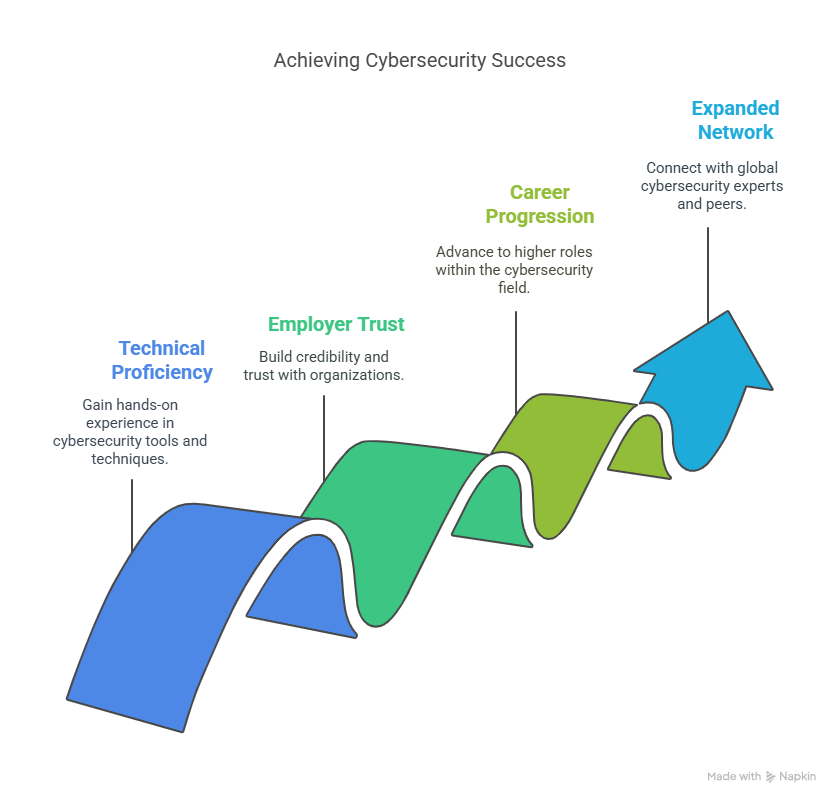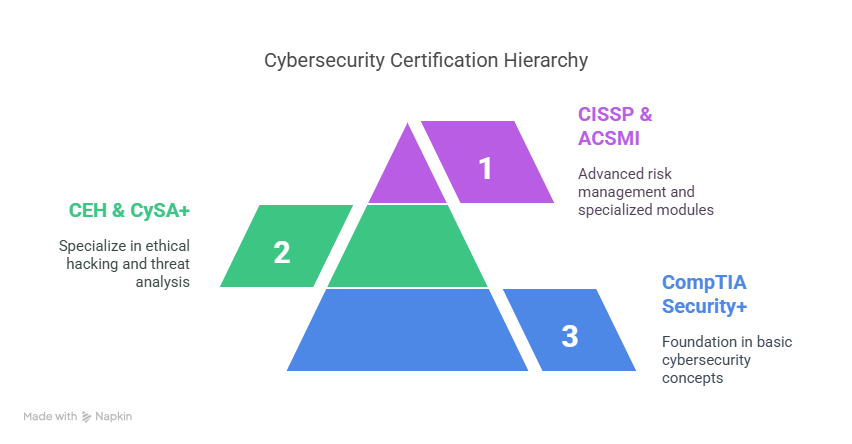Table of Contents
- What Is a Cybersecurity Analyst?
- Why Is Following a Cybersecurity Analyst Certification Path Important?
- The Complete Cybersecurity Analyst Certification Path
- Advantages of Certifications in a Cybersecurity Analyst Certification Path
- Career Opportunities Along the Cybersecurity Analyst Certification Path
- Final Thoughts
- FAQs About the Cybersecurity Analyst Certification Path
Cybersecurity Analyst Certification Path in 2025: Your Guide to a Rewarding Career
In 2025, cybersecurity remains one of the fastest-growing and most critical fields in the tech industry. With cyberattacks and data breaches becoming more sophisticated, the demand for skilled cybersecurity professionals continues to rise. Among these in-demand roles is that of a Cybersecurity Analyst—a specialist responsible for protecting organizations from cyber threats. If you’re aiming to start or advance your career in this dynamic field, following an It Specialist Cybersecurity Certification path is essential to gaining the skills needed to excel.
What Is a Cybersecurity Analyst?
A Cybersecurity Analyst plays a vital role in defending an organization’s data and systems from cyber threats. The job involves monitoring, analyzing, and responding to security incidents, all while ensuring systems are secure from breaches.
Key Responsibilities:
-
Monitoring Systems: Keeping an eye on activity logs to detect anomalies and potential threats.
-
Risk Assessment: Identifying vulnerabilities in networks and systems, and recommending appropriate security measures.
-
Deployment of Security Tools: Implementing firewalls, anti-malware software, and endpoint protections to safeguard organizational assets.
-
Incident Response: Investigating and responding to security breaches or cyberattacks.
It’s a role that requires both technical expertise and strong analytical thinking, and certifications are key to developing both of these skill sets.
Why Is Following a Cybersecurity Analyst Certification Path Important?
With cybersecurity job openings expected to increase by 33% through 2030, now is the perfect time to embark on this career path. A structured Cybersecurity Analyst Certification Path offers several advantages, such as:

-
Building Technical Proficiency: Certifications provide hands-on experience in areas like threat detection, security tools, and network defense.
-
Gaining Employer Trust: Certified professionals are trusted by organizations to handle complex cybersecurity challenges.
-
Career Progression: Achieving certifications often leads to advanced roles, such as Cybersecurity Engineer, Consultant, or Risk Manager.
-
Expanding Your Network: Certification programs connect you with cybersecurity experts and fellow professionals across the globe.
By following a well-structured certification path, you can fast-track your career and develop expertise that’s in high demand.
The Complete Cybersecurity Analyst Certification Path
To develop the skills necessary to thrive in this role, following a structured certification path is key. Here’s a suggested Cybersecurity Certification Test and Cybersecurity Analyst Certification Path for aspiring professionals:

1. Entry-Level Certification: CompTIA Security+
CompTIA Security+ is the perfect starting point for those with little or no IT experience. This widely recognized certification covers fundamental cybersecurity concepts such as network attacks, threat mitigation, and incident response.
-
Why It’s Ideal for Beginners: It requires no prior experience and provides essential knowledge that serves as a foundation for advanced roles in cybersecurity.
-
Cost: Around $392
-
Career Roles: Security Administrator, Systems Analyst
-
Ideal For: Those looking to break into the field and build a solid understanding of cybersecurity basics.
2. Core Certifications for Analysts: CEH and CySA+
Once you’ve gained a foundation, the next step is pursuing core certifications that further specialize your skills.
-
Certified Ethical Hacker (CEH): Focuses on penetration testing and learning how to think like a hacker to identify vulnerabilities. This certification is ideal for those interested in ethical hacking and proactive system testing.
-
Cost: $1,199
-
Career Roles: Penetration Tester, Vulnerability Analyst
-
Why It’s Useful: Provides foundational skills for penetration testing and ethical hacking.
-
-
CompTIA Cybersecurity Analyst (CySA+): This certification specializes in threat detection, analysis, and behavioral analytics. It’s perfect for those who want to focus on monitoring systems and responding to threats.
-
Cost: $392
-
Career Roles: SOC Analyst, Cybersecurity Specialist
-
Why It’s Useful: Focuses on skills needed for threat detection and analysis, which are vital for a cybersecurity analyst role.
-
3. Advanced Certification Choices: CISSP and ACSMI Modules
After becoming certified as an analyst, you can aim for more specialized certifications to deepen your expertise:
-
Certified Information Systems Security Professional (CISSP): A highly respected certification that covers advanced risk management and policy development across multiple domains.
-
Cost: $600-$1,000
-
Career Roles: Senior Security Professional, Cybersecurity Consultant
-
Why It’s Useful: This is ideal for professionals looking to take on leadership roles in security policy and risk management.
-
-
ACSMI’s Specialized Modules: ACSMI offers over 400 modular courses that cover advanced topics in analytics, forensics, and compliance. These modules allow you to specialize in areas that align with your career goals, providing flexibility in your learning path.
-
Cost: Varies based on the chosen modules
-
Why It’s Useful: Offers hands-on, real-world learning across various cybersecurity disciplines.
-
Advantages of Certifications in a Cybersecurity Analyst Certification Path
By completing certifications in this path, you’ll gain the following benefits:
-
Focused Skill Development: Certifications teach specific techniques for solving real-world cybersecurity problems.
-
Broader Market Reach: Certified professionals are qualified for roles across various industries such as finance, healthcare, IT, and government.
-
Financial Impact: Certified cybersecurity professionals can earn up to 40% more than their non-certified counterparts, with salaries for analysts ranging from $60,000 to $90,000.
Career Opportunities Along the Cybersecurity Analyst Certification Path
Certifications open doors to various cybersecurity roles. Here are a few examples:
-
SOC Analyst: Monitors systems and networks for potential security threats, leveraging SIEM software for threat detection.
-
Vulnerability Analyst: Proactively identifies system vulnerabilities, using tools to evaluate weaknesses and ensure systems are secure.
-
Threat Intelligence Analyst: Gathers intelligence and analyzes cybersecurity trends to predict and prevent potential threats.
-
Cybersecurity Consultant: Advises organizations on best practices and implements strategies to protect their data and systems from attacks.
Final Thoughts
The Cybersecurity Analyst Certification Path provides a clear roadmap for those aiming to build a successful career in cybersecurity. From foundational certifications like CompTIA Security+ to advanced credentials like CISSP, following this path will equip you with the skills needed to excel in this growing field. Complementing these certifications with platforms like ACSMI will give you the flexibility to dive deeper into specialized topics, setting you up for long-term success.
Start your cybersecurity journey today and position yourself as a trusted expert in securing the digital world.
FAQs About the Cybersecurity Analyst Certification Path
What is the Cybersecurity Analyst Certification Path?
It’s a structured approach to obtaining certifications in key areas of cybersecurity, including threat prevention, analysis, and response.
Can beginners enter this career path?
Yes, certifications like CompTIA Security+ are designed for those with little to no prior experience.
How long does it take to finish the certification path?
Core certifications typically take 6–24 months to complete, depending on time commitment.
Are certifications mandatory for cybersecurity analyst roles?
While not mandatory, certifications significantly increase your chances of getting hired and validate your skills.
What are the costs associated with this path?
Entry-level certifications like CompTIA Security+ cost around $392, while advanced certifications like CISSP range from $600 to $1,000.

Leave a Reply